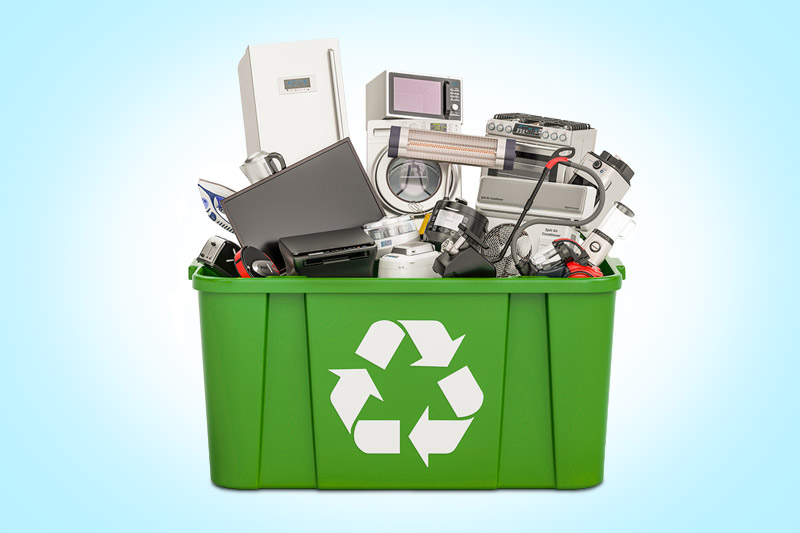Elevate Your E-Waste Monitoring With R2 Qualification: a Detailed Introduction
In the realm of accountable electronic waste monitoring, the relevance of executing effective approaches can not be overstated. As technology swiftly progresses, the need for correct disposal and recycling of electronic devices has actually come to be progressively important. One key approach to raise e-waste management techniques is by achieving R2 certification. This certification stands as a characteristic of quality in the field, representing adherence to rigorous standards that guarantee eco sound techniques. By discovering the advantages and procedures connected with R2 accreditation, a much deeper understanding of exactly how it can reinvent e-waste monitoring techniques arises, losing light on a path towards sustainability and moral disposal practices.
Value of E-Waste Monitoring

When e-waste is not taken care of properly, these toxic compounds can seep into the ecosystem, triggering injury to wildlife and possibly entering the food cycle, posturing dangers to human wellness. Additionally, the inappropriate disposal of e-waste contributes to contamination and greenhouse gas exhausts, intensifying environment change and environmental destruction.

Advantages of R2 Accreditation

Firstly, R2 qualification enhances trustworthiness by showcasing a company's commitment to sustainable practices. It guarantees customers, partners, and stakeholders that the firm follows rigid requirements for e-waste administration - r2 certification. This reputation can result in enhanced trust and improved partnerships with clients that prioritize ecological duty
Secondly, R2 qualification helps alleviate threats linked with improper e-waste disposal. By adhering to the strict guidelines stated by the qualification, companies can minimize the possibility of information violations, ecological contamination, and lawful effects. This proactive method safeguards the business's track record and decreases possible liabilities.
Lastly, R2 certification demonstrates a commitment to environmental stewardship - r2 certification. By properly handling electronic waste with accredited processes, organizations contribute to the conservation of resources, reduction of pollution, and promotion of a circular economy. This commitment not only benefits the environment yet additionally straightens with advancing customer assumptions for lasting service methods
R2 Accreditation Process Overview
Having established the advantages of blog R2 qualification in advertising reputation, threat reduction, and ecological stewardship, it is necessary to now describe the detailed procedure associated with acquiring this certification. The R2 certification procedure begins with a comprehensive review of the company's functional policies and treatments to make sure compliance with the R2 standard. This first evaluation is important in identifying any kind of spaces that need to be resolved prior to proceeding further.
As soon as the organization's practices straighten with the R2 conventional requirements, an independent third-party auditor performs an on-site audit to examine the implementation and efficiency of these practices. This audit consists of a thorough evaluation of documents, interviews with staff, and physical examinations of centers to validate compliance.
Adhering to an effective audit, the organization gets a certification choice based upon the auditor's findings. If accepted, the organization is approved R2 qualification, demonstrating its dedication to responsible e-waste administration. It is very important to note that keeping R2 certification needs recurring compliance with the standard's needs and regular audits to make sure ongoing adherence to best methods in e-waste recycling and disposal.
Trick Criteria for R2 Compliance
A crucial aspect of attaining R2 conformity is guaranteeing that all electronic waste (e-waste) handling centers fulfill stringent environmental and safety and security criteria. To adhere to R2 demands, companies have to adhere to essential requirements that concentrate on accountable e-waste monitoring techniques. These criteria include applying a documented ecological, health and wellness, and security monitoring system, making certain the safe and secure handling of data-containing tools, and performing extensive downstream due persistance to track the final location of e-waste products.
Furthermore, R2 conformity demands the appropriate screening, repair, and recycling of electronic tools to extend its beneficial life and minimize ecological influence. Facilities looking for R2 accreditation should additionally focus on worker wellness and safety by supplying essential training, personal safety tools, and a risk-free workplace. Additionally, maintaining detailed documents of e-waste handling activities and on a regular basis going through audits by certified accrediting bodies are important components of showing continuous compliance with R2 standards.
Influences of Sustainable E-Waste Practices
The implementation of lasting e-waste methods in accordance with R2 conformity not just guarantees environmental and safety and security requirements are met yet likewise considerably influences the general lifecycle of electronic items. By adhering to R2 requirements, electronic waste monitoring processes come to be much more efficient, minimizing the environmental footprint of electronic items. Sustainable e-waste techniques promote the appropriate disposal of digital elements, ensuring that dangerous materials are taken care of sensibly and do not wind up contaminating the atmosphere.
Furthermore, sustainable e-waste techniques can add to work creation in the recycling and refurbishment sectors, fostering Read More Here economic growth while promoting environmental obligation. Generally, the adoption of sustainable e-waste methods under R2 accreditation serves as a crucial step towards achieving a more environmentally sustainable electronic devices sector.
Verdict
To conclude, applying correct e-waste monitoring practices is vital for ecological sustainability and source preservation. R2 certification plays a crucial role in making certain responsible handling and disposal of electronic waste. By sticking to the rigid requirements stated by R2 standards, companies can not just reduce their environmental impact but additionally add to a much more sustainable future for generations ahead.
One secret method to elevate e-waste monitoring methods is by achieving R2 qualification. By checking out the benefits and procedures linked with R2 accreditation, a deeper understanding of just how it can transform e-waste management techniques emerges, losing light on a path in the direction of sustainability and honest disposal official source practices.
The R2 qualification process starts with a complete review of the company's operational plans and treatments to make sure compliance with the R2 criterion. If authorized, the company is given R2 qualification, demonstrating its dedication to accountable e-waste management. Generally, the adoption of sustainable e-waste techniques under R2 accreditation offers as an important action towards accomplishing an extra environmentally sustainable electronics sector.